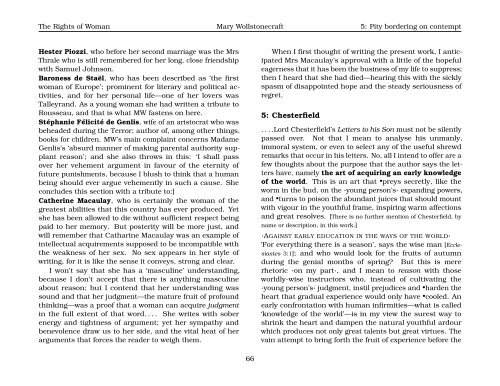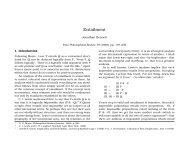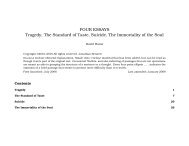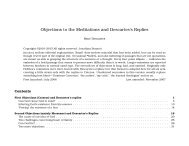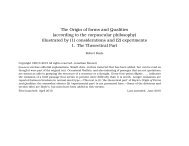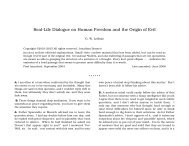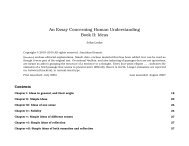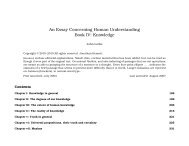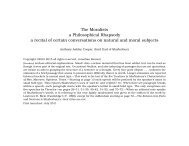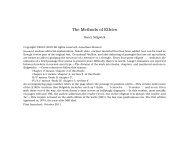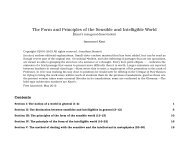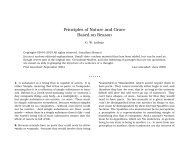A Vindication of the Rights of Woman with - Early Modern Texts
A Vindication of the Rights of Woman with - Early Modern Texts
A Vindication of the Rights of Woman with - Early Modern Texts
Create successful ePaper yourself
Turn your PDF publications into a flip-book with our unique Google optimized e-Paper software.
The <strong>Rights</strong> <strong>of</strong> <strong>Woman</strong> Mary Wollstonecraft 5: Pity bordering on contempt<br />
Hester Piozzi, who before her second marriage was <strong>the</strong> Mrs<br />
Thrale who is still remembered for her long, close friendship<br />
<strong>with</strong> Samuel Johnson.<br />
Baroness de Staël, who has been described as ‘<strong>the</strong> first<br />
woman <strong>of</strong> Europe’; prominent for literary and political activities,<br />
and for her personal life—one <strong>of</strong> her lovers was<br />
Talleyrand. As a young woman she had written a tribute to<br />
Rousseau, and that is what MW fastens on here.<br />
Stéphanie Félicité de Genlis, wife <strong>of</strong> an aristocrat who was<br />
beheaded during <strong>the</strong> Terror; author <strong>of</strong>, among o<strong>the</strong>r things,<br />
books for children. MW’s main complaint concerns Madame<br />
Genlis’s ‘absurd manner <strong>of</strong> making parental authority supplant<br />
reason’; and she also throws in this: ‘I shall pass<br />
over her vehement argument in favour <strong>of</strong> <strong>the</strong> eternity <strong>of</strong><br />
future punishments, because I blush to think that a human<br />
being should ever argue vehemently in such a cause. She<br />
concludes this section <strong>with</strong> a tribute to:]<br />
Ca<strong>the</strong>rine Macaulay, who is certainly <strong>the</strong> woman <strong>of</strong> <strong>the</strong><br />
greatest abilities that this country has ever produced. Yet<br />
she has been allowed to die <strong>with</strong>out sufficient respect being<br />
paid to her memory. But posterity will be more just, and<br />
will remember that Catharine Macaulay was an example <strong>of</strong><br />
intellectual acquirements supposed to be incompatible <strong>with</strong><br />
<strong>the</strong> weakness <strong>of</strong> her sex. No sex appears in her style <strong>of</strong><br />
writing, for it is like <strong>the</strong> sense it conveys, strong and clear.<br />
I won’t say that she has a ‘masculine’ understanding,<br />
because I don’t accept that <strong>the</strong>re is anything masculine<br />
about reason; but I contend that her understanding was<br />
sound and that her judgment—<strong>the</strong> mature fruit <strong>of</strong> pr<strong>of</strong>ound<br />
thinking—was a pro<strong>of</strong> that a woman can acquire judgment<br />
in <strong>the</strong> full extent <strong>of</strong> that word. . . . She writes <strong>with</strong> sober<br />
energy and tightness <strong>of</strong> argument; yet her sympathy and<br />
benevolence draw us to her side, and <strong>the</strong> vital heat <strong>of</strong> her<br />
arguments that forces <strong>the</strong> reader to weigh <strong>the</strong>m.<br />
66<br />
When I first thought <strong>of</strong> writing <strong>the</strong> present work, I anticipated<br />
Mrs Macaulay’s approval <strong>with</strong> a little <strong>of</strong> <strong>the</strong> hopeful<br />
eagerness that it has been <strong>the</strong> business <strong>of</strong> my life to suppress;<br />
<strong>the</strong>n I heard that she had died—hearing this <strong>with</strong> <strong>the</strong> sickly<br />
spasm <strong>of</strong> disappointed hope and <strong>the</strong> steady seriousness <strong>of</strong><br />
regret.<br />
5: Chesterfield<br />
. . . .Lord Chesterfield’s Letters to his Son must not be silently<br />
passed over. Not that I mean to analyse his unmanly,<br />
immoral system, or even to select any <strong>of</strong> <strong>the</strong> useful shrewd<br />
remarks that occur in his letters. No, all I intend to <strong>of</strong>fer are a<br />
few thoughts about <strong>the</strong> purpose that <strong>the</strong> author says <strong>the</strong> letters<br />
have, namely <strong>the</strong> art <strong>of</strong> acquiring an early knowledge<br />
<strong>of</strong> <strong>the</strong> world. This is an art that •preys secretly, like <strong>the</strong><br />
worm in <strong>the</strong> bud, on <strong>the</strong> ·young person’s· expanding powers,<br />
and •turns to poison <strong>the</strong> abundant juices that should mount<br />
<strong>with</strong> vigour in <strong>the</strong> youthful frame, inspiring warm affections<br />
and great resolves. [There is no fur<strong>the</strong>r mention <strong>of</strong> Chesterfield, by<br />
name or description, in this work.]<br />
·AGAINST EARLY EDUCATION IN THE WAYS OF THE WORLD·<br />
‘For everything <strong>the</strong>re is a season’, says <strong>the</strong> wise man [Ecclesiastes<br />
3:1]; and who would look for <strong>the</strong> fruits <strong>of</strong> autumn<br />
during <strong>the</strong> genial months <strong>of</strong> spring? But this is mere<br />
rhetoric ·on my part·, and I mean to reason <strong>with</strong> those<br />
worldly-wise instructors who, instead <strong>of</strong> cultivating <strong>the</strong><br />
·young person’s· judgment, instil prejudices and •harden <strong>the</strong><br />
heart that gradual experience would only have •cooled. An<br />
early confrontation <strong>with</strong> human infirmities—what is called<br />
‘knowledge <strong>of</strong> <strong>the</strong> world’—is in my view <strong>the</strong> surest way to<br />
shrink <strong>the</strong> heart and dampen <strong>the</strong> natural youthful ardour<br />
which produces not only great talents but great virtues. The<br />
vain attempt to bring forth <strong>the</strong> fruit <strong>of</strong> experience before <strong>the</strong>


